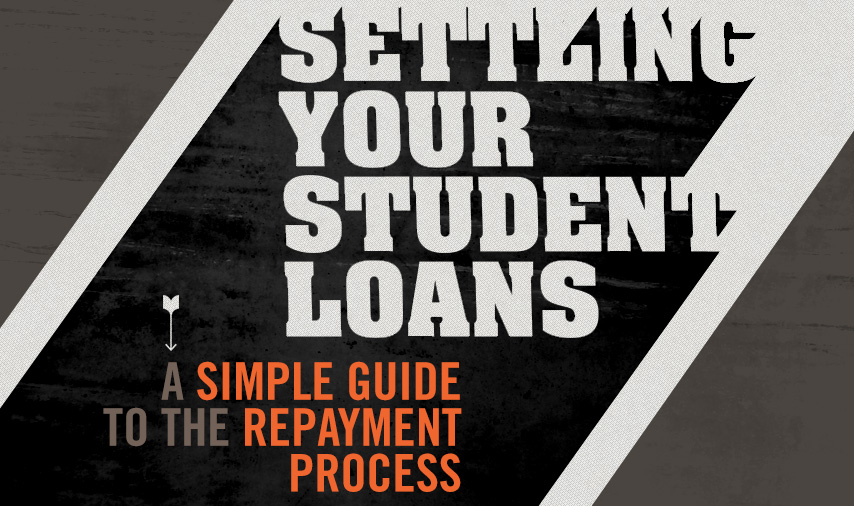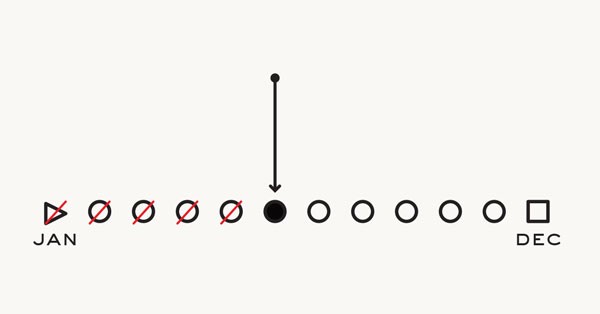It’s easy to feel lost right out of college. For the first time ever, you’re dealing with rent, utilities, phone bills, pre-employment checks – keeping track of all of these is going to be tough enough without having to hack and slash your way through a jungle of student loans. While no one’s going to guide you through each and every step you have to take, here’s a map to help you along the way.
Understanding Your Options
Your first step in traversing the hostile terrain of your loans is figuring out your “repayment plan”- how much you’ll be paying and for how long. While the exact nature of your loans is going to help shape that, chances are you’ll be required to pick from one of these options below:
Standard and Consolidated
This is going to be the default option applied to your loans, breaking each one down into 120 equal monthly payments (with some growth over time due to interest). It’s about as basic as it gets, with no real negatives or positives other than the general consistency of it (think of it like having to pay for really, really expensive toothpaste). You’ll always be able to build your budget around knowing exactly how much you’ll have to pay over the next decade.
Now there are going to be those of you dealing with a host of different loans and providers, and with it being enough of a headache to keep track of one loan, let alone six different types, “consolidation” might be the right option for you. This means you’ll have all of your loans added together into one lump sum, with the interest rates averaged together (and rounded up to the nearest 1%). While that does potentially mean paying a bit more in interest over the long run, it will save you a lot of hassle, as well as the risk of accidentally defaulting on one of your loans (more on that in a second).
Of course, the basic route isn’t for everyone…
Graduated Repayment
When it comes to our dream jobs, it’s always easier to move up than move in. Most every head chef had to start off working the prep station, most every marketing director had to start off writing copy, and most every biologist had to start off scrubbing out the lab rat cages. Straight out of college (and in this economy), you’re probably not going to be working that position that lets you do what you love and get paid handsomely for it, and the “graduated” repayment plan is designed for young people who aren’t quite where they want to end up but at least have their foot in the door.
In this plan, your monthly payments will start comparatively low but increase in size over time, based off of the assumption that you’ll be making more 5 years from now than you do today. Again, this is going to lend itself most to those of you who have a career goal in sight but still a little while to get there.
Extended Repayment
As the name suggests, this is essentially the same as your standard or consolidated repayment plan, but stretched over a much longer period. While standard repayment generally takes place over a decade, an extended plan can take up to 25 years. This means that your monthly payments will generally be lower; however, the toll the interest rates take will mean you’ll ultimately be paying a much higher amount in the long run.
While chipping slowly away at our debt for a quarter of a century isn’t going to be fun, there are going to be those who’ll prefer this route – especially those facing higher costs of living or other immediate expenses. Is it going to feel like tunneling out of prison with a rock hammer? Absolutely, but you can take comfort in knowing you will still make it to freedom.
Income-Based Plans
There are a host of different income-based plans out there (Income Sensitive, Income Contingent, and Pay as You Earn), and while each has its own unique stipulations all operate on the same principle of basing your monthly payments in proportion to your monthly salary. In simpler terms, the less you make, the less you pay – these plans are designed to cut individuals facing financial hardship some slack, giving you the ability to pay an affordable portion of whatever you make with the possibility of some debt-forgiveness down the road. Exactly which individual plan you qualify for is going to depend on the size of your family and other factors – be sure to contact your loan provider to check your eligibility.
Forbearance and Deferment
Naturally, there will be times when we’ll find ourselves in a tight spot but still not have it so bad as to qualify for an income-based plan. You won’t exactly be dying of dysentery but you won’t be buying that fancy name-brand ramen either. Don’t panic, there are options here as well. Consider deferment or forbearance.
Deferment
During the “deferment” of a loan, you’re not required to make any payments and interest on the loan is temporarily frozen. This happens when you’re a full-time student, though you’ll also be able to get it if you’re performing some form of public service, such as a stint in the military or the Peace Corps. This is going to be a great option whether you’re looking to dive right into the world of social justice or if you’re just looking to build up some vocational experience without having to worry about keeping up with payments at the same time.
Forbearance
This differs from deferment in that you won’t be required to make loan payments but your interest will continue to accrue. In times of financial hardship or serious illness, you can contact your loan provider to request forbearance – though you can also get it automatically through certain kinds of medical internships or teaching positions. It’s not a “Get-Out-Of-Jail-Free” card so much as it is work-release for good behavior.
It’s vital to know that once your period of forbearance ends, you’ll see the interest “capitalized”- added onto the “principal” (the starting amount). In simpler terms, the more periods of forbearance you take, or the longer they are, the more your ultimate payment will be. Try to use these only when absolutely necessary.
Paying Early
Maybe you don’t have much in the way of loans to begin with, or maybe you’re the kind of person who likes being in debt as much as you like wearing a barbed-wire sweater. Whatever the cause, there’re going to be those of you who’ll have the option of paying your loans off early. Understand that doing so, as liberating as it might be, isn’t going to do wonders for your credit score.
Now don’t misunderstand me – while paying off your loans won’t hurt your credit per se, it does close off a potential avenue for growth. See, your credit score is developed by you actually having payments to make. It sounds complex, but think of it this way: lenders like lending to people who they know can make payments consistently over a long period of time. Here’s another example: when you eat out at a restaurant, you’re going to want to know that you’re order is going to be good every time, instead of having gotten lucky once. If you take care of your sole source of debt in one fell swoop, potential creditors have no way of knowing if you’re a brilliant and responsible citizen who’ll do that with every loan you get or if you’re an irresponsible degenerate who just happened to have enough cash for a one-time payment.
You can offset this by taking some time to pay your loan (though chances are you’re going to have to save up for a couple years anyways). It’s not the same as making a decade of regular payments, but if you maintain the loan for a few years that should at least be a start to building your reputation as an honest and reliable borrower.
Of course, you will need to consider the reverse problem as well. As much as a major loan does help build up your credit score, what needs to be remembered is that it is still a liability while you have it. Meeting monthly payments will help bump up your numbers, but missing a single one will wreck them. Quite simply, you can’t default on a loan you don’t have, and I don’t think I’m alone in preferring to have as few threats to my financial stability as possible. The general flexibility that you’ll have from being debt-free also shouldn’t be ignored. While some of you have your careers mapped out already, plenty of you are still looking to travel or to experiment with different lines work. Not having to worry about making a monthly payment is going to make that infinitely easier, and naturally paying off early means actually saving money that’d otherwise be lost to interest accrual.
It All Comes Down To You
And that’s really it. There is no overarching rule to student loans (other than that you should pay ‘em on time). Whether or not you’ve got a job out the gate, a family depending on you, or a desperate desire to celebrate your birthday on top of Mount Kilimanjaro, all are going to factor into what plan is best suited to you. As daunting as the debt might be, the real challenge is going to be figuring out where you are now and where you want to be. Understand your loans, and you’ll have taken the first step in charting out how to get there.
















